Is there an epidemic of plural abstract nouns?
« previous post | next post »
Anthony Gardner, "Absurd Persons Plural", The Economist 12/12/2012:
Earlier this month I went to a lecture by the American novelist Richard Ford. Called "Why novels are smart", it was brilliant and thought-provoking. But my thoughts were also provoked by the British academic who introduced him, commending—among other things—his "prose styles".
Now, Richard Ford is without doubt a great stylist; but he only has one style. He has honed it over many years, and having brought it pretty much to perfection, he very sensibly sticks to it. So why this mysterious use of the plural?
The same question might have occurred to those listening that morning to BBC Radio 4’s "Start the Week". In the course of a discussion about Germany, one panelist referred to the country’s "pasts". I suppose you could argue that, since the country was divided for 40 years into East and West, it has two pasts—but that strikes me as sophistry. The sorry truth is that we are facing a new linguistic fad: the use of the plural where the singular has always been used before, and indeed would make much more sense.
Specifically, we’re talking about abstract nouns. I first noticed the shift a few months ago when another speaker on Radio 4 came out with "geographies". For a while I thought it might be confined to academia; then I realised that it was creeping into the high-faluting vocabulary beloved of arts organisations. One spoke proudly of its "artistic outputs" and what the public wanted "in terms of outcomes".
When I read this, I wondered whether Mr. Gardner has noticed a real linguistic trend, or whether pluralization variation — in both directions — has always been with us, and his belief in Richard Ford's stylistic uniformity primed him to notice a certain subset of examples.
The evidence of the Google Books Ngram tool is that the rate of pluralization of style has indeed increased — from around 8% a century ago to around 18% today. But the trend has been a long and gradual one, without much recent change:
There have always been perfectly normal reasons to pluralize style, as in the 1898 book A Handbook of Architectural Styles, or the 1947 work that says of Joseph Conrad that "It was perhaps from Polish and French prose styles that he adopted a fondness for triple parallelism, especially in his early works". Since Mr. Gardner's complaint is that someone referred to Richard Ford's way of writing as his plural "prose styles", when the singular would have been more appropriate, looking at pluralization of style in general may not be a good proxy for this case. "His prose styles" didn't make the Google Ngram cut, but "his style(s)" shows roughly the same trend as "style(s), though its overall pluralization rate is much lower, and the last 30 years have been declining rather than flat:
What about the other anomalous abstract-noun plurals that Mr. Gardner noticed? The pluralization percentage of past shows a steadier trend, increasing by a factor of 8 or so since WWII, while remaining at a low enough level that any examples will be striking:
And geography shows a steeper and more recent rise, increasing in pluralization percentage by a factor of 8 since 1980, to a level above 7%:
But output(s) and outcome(s) again show longer-term and gentler trends (though outcome's pluralization percentage has increased by an impressive factor of nearly 50 times, from less than 1% to nearly 46%):
At the end of his post, Gardner foresees a grim future for singular abstract nouns in English:
Virologists tracing the history of a disease speak darkly of the moment when it leaps from one species to another. I believe that such a moment came the morning after Richard Ford's talk when a senior member of the National Health Service used the word "behaviours" on a national news bulletin. I saw too late how misguided my complacency had been: Pandora’s box had been opened, and no amount of wishing would put the contents back. So what lies ahead? Will we be subjected to "contradictory thinkings", "beautiful lyricisms" and "heartfelt mournings"? Almost certainly. The nonsenses of using plurals are merely in their infancies.
Here, I believe, he's clearly suffering from the Recency Illusion:
Still, the particular examples that Mr. Gardner cites have all increased in pluralization percentage, though the trend is mostly on the scale of 50-100 years rather than 5-10 years, much less one day to the next. This suggests that his ear for historical direction is good, even if his sense of time-scale is off. But is increasing pluralization in fact a general trend for abstract nouns in English? Well, it's easy to find abstract nouns whose pluralization percentage has been on the skids for the past century or so:
And there are plenty of others where nothing much has changed.
Given a list of all the English words that someone takes to fall into the category of "abstract noun(s)", it wouldn't be hard to check their historical pluralization percentage(s) in the unigram list(s) downloadable from the Google site — but this is beyond my ambition(s) for this morning.
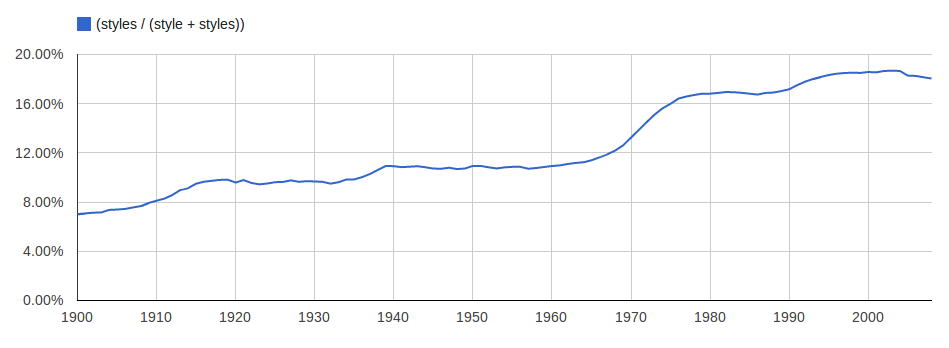
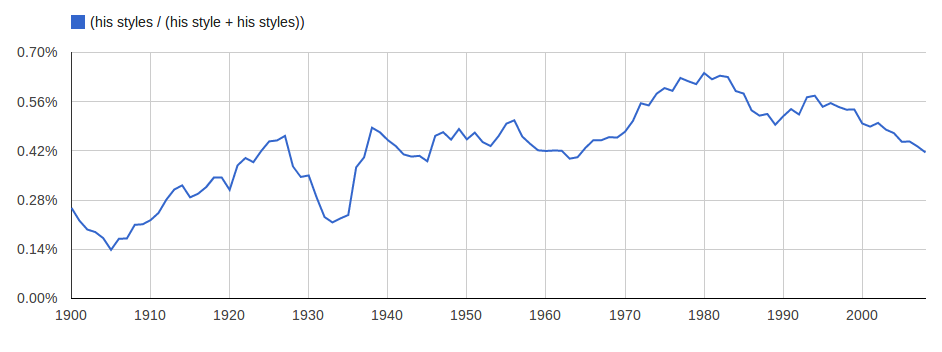
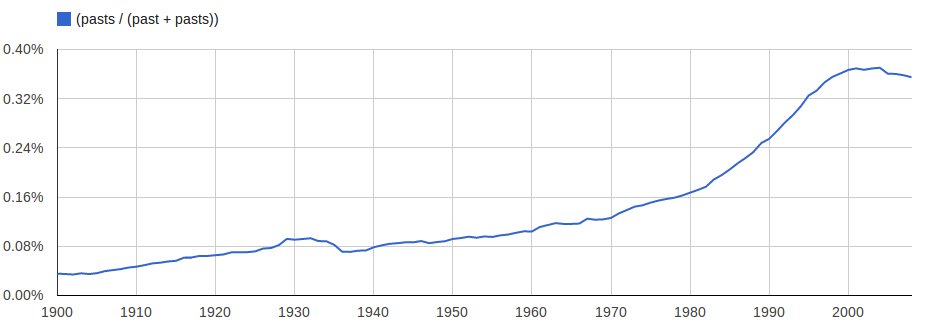
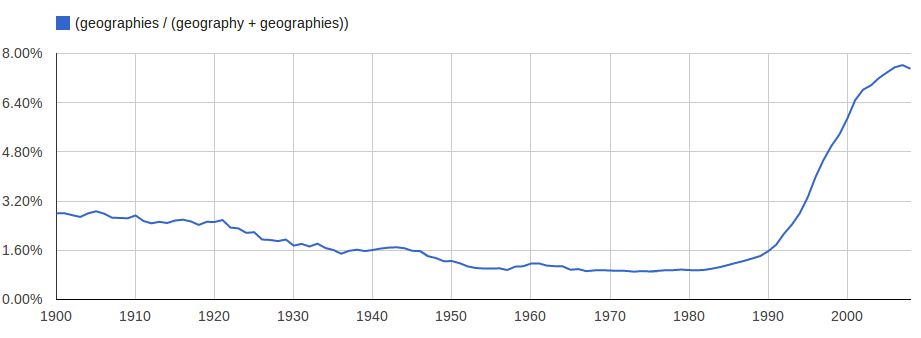
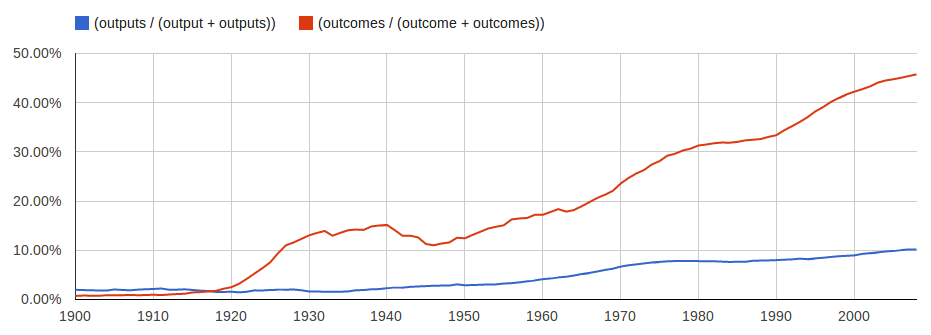
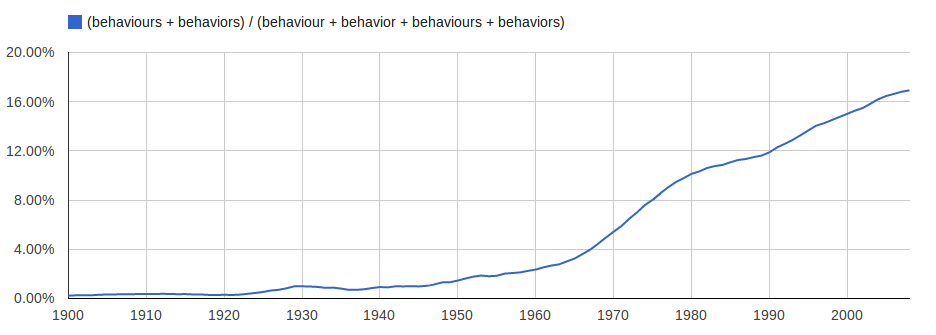
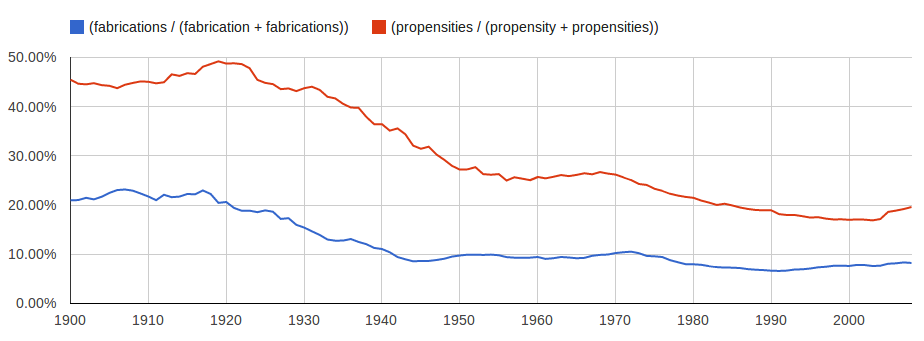
Matt Baldwin said,
December 18, 2012 @ 6:33 am
Very interesting piece, and a nice n-gram take-down of Mr. Gardner's anecdotes.
I think, however, Mr. Gardner may be on to something without realizing what it is he is actually noticing.
I would like to add that there are two cultural trends at work, a theoretical-critical trend, and a bureaucratic trend, in at least some of the mentioned pluralizations (there's one again… and my browser's spell check doesn't like it).
The theoretical-critical trend is this: in historical-critical studies, say, of Judaism and Christianity, but also of American Historiography or Humanistic Geography, it is become fashionable to draw attention to plurality and difference among historical or sociological groups that do properly belong within the larger rubric of study, but only because of their "family resemblances" (borrowing Wittgenstein for social science). Such groups are different enough from one another, or have different enough worldviews, that it might be better to speak not of "early Judaism" but of "early Judaisms," and mutatis mutandis, "early Christianities," the "geographies" of various cultural groups, and the varied "pasts" promoted by "historians," politicians and the like, or understood by populaces. The past is, in particular, vulnerable to a plurality of reconstructions and we are stuck wading through them; that's a historian's job.
The Bureaucratic Trend, on the other hand, I'm sure most readers of your blog will have no trouble recognizing in their own work environments. "Outputs" and "Outcomes" are pedagogical buzzwords from the Outcomes and Assessment movement, borrowed from the business world. Students don't produce "output" broadly and generally speaking; that's not specific enough for assessment. They produce "outputs" (tests, papers, presentations, discussions, etc.) and we measure these "outputs" against the "outcomes" we hope will result from our teaching. We don't have just one desired "outcome," we have, usually, three or five or seven or nine of the turgidly worded nasty statements. So, it isn't surprising to see that this language is creeping into the vocabulary of those who run public-arts organizations. They too are working to assess their "outcomes," by looking at their "outputs."
Oh bother, all this talk of outcomes and assessment and now I've broken out in hives again.
[(myl) Indeed, though Mr. Gardner would be a bit late to the "Judaisms" party, which seems to have flourished in the 1980s:
]
Prentiss Riddle said,
December 18, 2012 @ 7:28 am
Note that Gardner himself has no problem with "arts." #doasisaynotasido
GeorgeW said,
December 18, 2012 @ 8:48 am
Although I am not prone to peevery, I find 'peoples' a little annoying and maybe a little pretentious.
Dexter Edge said,
December 18, 2012 @ 8:51 am
Another example, which may also follow Matt Baldwin's "theoretical-critical" trend, is "musics." Because I didn't remember hearing the plural form at all when I was in graduate school in the 1980s, I had expected it might show the pattern of "geographies," with a relatively recent rapid rise. But in fact the rise in "musics" seems more gradual, beginning already in the 1960s and 70s. I haven't had time to investigate early occurrences, but it's interesting that quite a few examples of "musics" in the 1970s seem to come from Billboard magazine. Now the word is quite common in academic book titles.
Ellen K. said,
December 18, 2012 @ 8:52 am
"Arts" isn't the same kind of thing. It's plural because there's more than one art. Painting is an art. Sculpture is an art. Etc.
Whereas Gardner is saying "styles" is being used where there's no multiple styles.
Jonathan said,
December 18, 2012 @ 9:29 am
Only one abstract plural bothers me: maths. But then I'm an American.
Tim Silverman said,
December 18, 2012 @ 9:31 am
In the specific case of "behaviours", I'd guess one source might be ethology (the study of animal behaviour). There, the approach that has been developed is to tease apart the totality of an animal species' "behaviour" into separate activities related to particular situations (how it attracts mates, how it feeds its offspring, how it stalks prey, etc, etc), which are independent of each other, and are naturally designated "behaviours" rather just aspects of a single undifferentiated "behaviour". The timing of the rise of the plural would match this well (from my understanding of the history).
Mr Punch said,
December 18, 2012 @ 10:03 am
Is this phenomenon, if it exists, largely British?
J.W. Brewer said,
December 18, 2012 @ 10:14 am
For extra credit, combine multiple such plurals in a single jargony phrase, as for example in the book title "Crossing Boundaries: Feminisms and the Critique of Knowledges" (published 1988, but apparently largely developed from papers first delivered at a 1985 academic conference). I thought I might have my own historical version of a recency illusion, associating the rise of the plural form "feminisms" with my own college years (1983-1987) when it might have just been the case that I was moving in different language-community circles than I previously had and thus more likely to be first exposed to college-town jargon which might have already been long-established in that environment, but the google n-gram in fact shows "feminisms" taking off more or less in that period.
Jonathan said,
December 18, 2012 @ 10:15 am
I for one celebrate our Englishes!
And PS "peoples" means something different from "people".
Lazar said,
December 18, 2012 @ 10:20 am
@GeorgeW: What bugs me is the fact that the once-singular "people" somehow managed to become the common plural form of another noun, "person", to which it's entirely unrelated. It's an inescapable part of my own native lect and all, but the etymological part of my brain still chafes at it.
@Jonathan: British "maths" is not plural; it's a singular which merely retains the "s" from the similarly singular "mathematics".
@Mr Punch: I don't think so. Based on my limited experience, I associate these usages with trendy academic-speak here in the US.
Ben Zimmer said,
December 18, 2012 @ 10:33 am
Jonathan mentioned "Englishes" — that one occurred to me too. It's been rising precipitously since the '80s.
James said,
December 18, 2012 @ 10:40 am
Lazar: the OED says that 'people' has been used with plural concord since at least the 15th century! E.g. 1496,
People kepe not theyr vowes..but breke them retchelesly or wylfully.
Or, from "Much Ado About Nothing",
A man may liue as quiet in hell, as in a sanctuarie, and people sinne vpon purpose, because they would go thither.
And as a mass noun maybe, or possibly plural, from Chaucer "A Knight's Tale",
The paleys ful of peple up and doun, Heere thre, ther ten.
mollymooly said,
December 18, 2012 @ 11:12 am
@Lazar:
A phenomenon called suppletion. Cf. goed>went, and (in progress) fewer>less.
John O'Toole said,
December 18, 2012 @ 11:29 am
I work as a French-to-English translator, with quite a lot of texts in contemporary art and art history, precisely the area that Mr. Gardner singles out. I've noticed the trend for sometime–this is utterly subjective and I would appreciate anyone with real Google Books Ngram expertise to do a quick study. Two examples come to mind: comportements (behaviors), when, in a French-speaking university and French lit department, "comportement" would have been sufficient, circa mid- to late 1980s; and avant-gardes (ditto). As a native-English speaker taking a degree in French lit at the French-speaking University of Geneva, I'm very confident that had I used "comportements" or "avant-gardes" at the time, any professor would have pointed out to me that that is incorrect French usage. And I'd wager that if those professors could have done a quick study of usage, they would have found examples already popping up in the prose (proses?) of the leading "lights" of French criticism. A suspicion, of course, although again someone with Ngram expertise could look at, say, Foucault's works compared with the body of French prose being published at the time. I have been "translating" the French "avant-gardes" (no, really, French art critics are dead keen on that; it's not just me and my confirmation bias) as the singular "avant-garde" in English. Now I may make the leap and go with the plural (although some English readers will surely sniff, Ha, there's a bad translation!)
marie-lucie said,
December 18, 2012 @ 11:30 am
person/people
Once, when teaching students from very low educational backgrounds, I was told that "persons" was wrong, the plural of "person" being "people".
martinb said,
December 18, 2012 @ 12:04 pm
Here's another recent one: "new technologies", where once the singular sufficed.
Electric Dragon said,
December 18, 2012 @ 12:35 pm
One should also note the influence of technical jargons, which often use such abstract nouns as terms of art in the service of concrete objects. For instance, a word processor or a web design tool might use "style" to mean a specific set of formatting instructions, of which several might be used in a document. (MS Word has "Body", "Heading", etc styles.) I have used a system which uses the word "outcome" to mean a specific stage in a workflow. Programming languages frequently use "inputs" and "outputs" in the plural in reference to functions. One application I know of used the term "Methodology" to describe a way a sales process could be organised, so of course there were multiple Methodologies.
DavidO said,
December 18, 2012 @ 12:41 pm
@Jonathan: Maths isn't a plural. Maths stands for Mathematical Anti-Telharsic Harfatum Septomin.
http://en.wikiquote.org/wiki/Look_Around_You#Maths
Henning Makholm said,
December 18, 2012 @ 12:44 pm
My impression is that using many of these abstract nouns imply a claim that "I have studied such-and-such subject deeply enough that I can distinguish between its various forms well enough not only to be aware that there are differences, but to count how many different forms this phenomenon can take". At least many of the examples that get people in a huff smell like intellectual bragging to me.
Unrelated, and out of idle curiosity, which other languages have the "some people"/"a people" combination? Danish "folk"/"folk" match both senses (and only add to the confusion in that the countable "folk" happens to be identical in plural, as is common for monosyllabic neuter nouns). On the other hand German seems to distinguish between "Leute" and "Volk".
Since "people" is of Romance origin is the double meaning found in Romance languages too?
Rodger C said,
December 18, 2012 @ 1:23 pm
@marie-lucie: Well, I've never seen a Bureau of Missing People.
Jerry Friedman said,
December 18, 2012 @ 1:37 pm
@marie-lucie: I'm not from a low educational background, but I'd say your students are right except in formal legal and police usage and in a few phrases that have escaped—"missing persons", "person or persons unknown". Some prescriptivists favor "persons" for well-defined groups of well-defined number, but only 83 persons actually talk that way. (I counted.)
E. Beattie said,
December 18, 2012 @ 2:01 pm
"People" is the plural of "person" in common parlance. "Persons" has now an almost exclusively legalist usage. I suspect that it may be a result of the fact that "people" is a collective plural, while "persons" retains the individual identities of the subjects (which makes it clearer that the parties will be treated individually under the law, rather than collectively as a group).
GeorgeW said,
December 18, 2012 @ 2:19 pm
Jonathan:"And PS "peoples" means something different from "people'."
Yes, in some cases it does and implies different subgroups within the bigger group. However, it is sometimes (often) used when 'people' would do just fine.
A bit of a digression, but I think it is interesting how politicians speak about what "the American people want" which seems to mean "my constituents who support me." I don't think I have ever heard a politician refer to 'the American peoples.'
AntC said,
December 18, 2012 @ 3:20 pm
waters (of the Nile — biblical) is, I believe, a literal translation from the Hebrew, which uses plural for mass nouns.
The one that really annoys me is behaviours psycho-babble.
Lazar said,
December 18, 2012 @ 3:32 pm
@AntC: I think I've read that the Latin word for water was originally something like "aquom", but that people started using its plural form so much that it got reanalyzed as a feminine singular.
Theodore said,
December 18, 2012 @ 3:47 pm
More on the technical jargon Electric Dragon mentioned: Not just software, but electronic hardware (such as audio) has inputs and outputs which are discrete and concrete (not abstract).
I can see no reason to avoid using "architectures" when comparing the Von Neumann and Harvard, for example.
J.W. Brewer said,
December 18, 2012 @ 3:57 pm
@John O'Toole – a decent corpus search of French against English to establish the timelines of the parallel usage in both tongues would be interesting because many of the college-town/academic-jargon contexts in which I think of this sort of pluralizing being in vogue from the 1980's forward are in precisely the subsets of the intelligentsia that were particularly prone to be reading fashionable French post-structuralist whatevers. So if you'd told me that the rise of "feminisms" in AmEng in the '80's was a calque of a '70's use of "feminismes" by Cixous or Kristeva or someone like that, it would seem plausible to me. But I suppose it's not inconceivable that trendy French academics were themselves reading trendy American academics and there could have been influence going the other way.
But on the other hand there's an I think substantially older usage (arguably still jargony) in which a particular sort of "academic" word can be both a mass noun and count noun. For example, "epistemology" is both a mass noun referring to a particular subfield of philosophy and a count noun meaning a particular theory of or approach to epistemology, as in "Hume's epistemology" or the now-reasonably-common NP "rival epistemologies." I was able with minimal rummaging in google books to quickly find a striking sentence with that plural in it from back in 1895, proclaiming (in the context of a sermon commemorating the then-recently-deceased Rev'd Dr. James McCosh, who had variously been president of Princeton, a working philosopher, and a Presbyterian dominie) that the metaphysician of today "cannot afford, as he once could, to construct epistemologies, and shoot theories of the universe out of a pistol, without regard to the facts which the psychologists are handling." I would guess that instance of the plural could be antedated with a little more work, but it was too good a quote not to share to make the basic point of pre-20th-century usage that would have remained comprehensible to Princeton undergraduates even unto the present generation. Similarly, it's pretty easy to find plural "Christologies" (meaning different and often inconsistent theories concerning the subject matter of mass-noun Christology) in academic theological writing at least back to circa 1850.
Charles in Vancouver said,
December 18, 2012 @ 4:12 pm
Speaking as a 30 year old Canadian who's studied linguistics, I don't see what the fuss is about. The plural of what would normally not take a plural usually means "types of" in some respect.
Second and third-wave feminisms. French and German cuisines. Casual and formal styles. Baked and fried foods. Acidic and basic chemistries of a biomolecule.
Is it strange of me to find these usages completely acceptable and comprehensible?
David Morris said,
December 18, 2012 @ 4:54 pm
@Jonathon: probably about as much as 'math' bothers me.
Mike G said,
December 18, 2012 @ 5:31 pm
On the term "persons": although E. Beattie suggests that "'Persons' has now an almost exclusively legalist usage," it is common in progressive Christian discourse to use "persons" when trying to exercise nuance between matters of individual experience versus the congregational collective. It would be entirely consistent, for example, to say, "God moves both within persons and among people." To express that as "within and among people" is (arguably) to express something different. (Unfortunately, I don't have the time right now to base this on anything more than a personal observation, for which I apologize.)
mollymooly said,
December 18, 2012 @ 6:50 pm
nGrams for
"three people" vs "three persons" (1:10 1800, 3:1 2000)
and
"many people" vs "many persons" (1:2 1800, 20:1 2000)
Ellen K. said,
December 18, 2012 @ 9:17 pm
I'm not understanding the problem with behaviors. (Or behaviours, for those who prefer to spell it that way.) And no examples have been given. It strikes me as an ordinary plural noun. One behavior, two behaviors. One of those nouns that's both a count noun and a non-count noun.
Is it a lack of familiarity with the count-noun use of the word? Or is the word being used in the plural with a non-count meaning?
leoboiko said,
December 19, 2012 @ 8:32 am
Roland Barthes par Roland Barthes, 1975:
Nathan said,
December 19, 2012 @ 6:47 pm
Peoples is peoples. Okay?
Marja Erwin said,
December 19, 2012 @ 6:59 pm
Of course, the ngram for "three persons" vs. "three people" may be biased by the prevalence of trinitarian theology. But the old form seems grotesquely stilted.
Pete said,
December 19, 2012 @ 11:14 pm
This usage doesn't bother me. It's frequently used in mathematics – we have geometries, algebras, topologies, logics. I'm surprised to hear that "outcomes" is an irritant, as often used in probability. But "Judaisms" does make me cringe.
bloix said,
December 20, 2012 @ 1:18 am
I think there is a trendy usage, which would have nothing to do with Richard Ford and is what Matt Baldwin has identified. The implication is that certain things are relative and different for different groups, and to treat them as if there were only one is to privilege the dominant discourse and to silence alternative discourses. (Forgive me, I'm not an academic and I don't mimic the jargon particularly well.)
So, histories not history, geographies not geography, etc.
Some examples:
Social Geographies: From Difference to Action, by Ruth Panelli (Sage 2004)
Maternities: Gender, Bodies, and Space, by Robyn Longhurst (Routledge, 2008)
Feminisms, ed. Kemp and Squire (Oxford 1998)
Sexualities, a journal
etc.
mollymooly said,
December 20, 2012 @ 2:39 am
Marja Erwin
I hadn't thought of that; in fact "four persons" vs. "four people" is less "persons"-leaning, but only slightly (1:10 1800, 4:1 2000).
Rodger C said,
December 20, 2012 @ 1:15 pm
As a humanities scholar I constantly come up against the absence of plural abstracts from Word's dictionary.
AntC said,
December 20, 2012 @ 4:29 pm
@Ellen K. behaviours as a count noun.
Per @Charles, I can sort-of understand where it's shorthand for 'types of behaviour'.
Per @bloix, different social groups or individuals each have a distinct behaviour, so I can (grudgingly) concede those as behaviours.
But where it really grates is talking about the behaviours of a single individual, as if they have a fragmented personality, where their well-behaved persona is disconnected from (and not to be judged by) their rap-loving, obscenity-riddled, misogynistic, murdering behaviour. The 'some of Hitler's behaviours were 'differing', but he was very kind to dogs' sort of psycho-babble.
But, hey, this is aesthetics/peevery: I don't have to provide a 'logical' explanation.
leoboiko said,
December 21, 2012 @ 6:30 am
This plural can also be used in a derogatory way, to feign ignorance of the subject etc., as in this example by Dresden Codak comics:
Bloix said,
December 21, 2012 @ 10:02 am
"Archaeologies" is a great example. There's actually a journal called "Archaeologies," and its website contains other examples of this usage of the plural:
"[The journal] emphasizes contributions that seek to recenter (or decenter) archaeology, and that challenge local and global power geometries…
"Recognizing the importance of non-Western epistemologies and intellectual traditions…"
http://www.springer.com/social+sciences/anthropology+%26+archaeology/journal/11759?detailsPage=press
Xmun said,
December 21, 2012 @ 2:21 pm
You don't have to refer to a Hebrew origin to explain "waters", though there may be a literal translation behind such a phrase as "By the waters of Babylon". But we also speak of going to Bath, or the Spa, to take the waters, etc.
I'm pretty sure that Waiwera, the name of a town in New Zealand where there are hot springs, is to be understood as a plural: Wai (water or waters) wera (hot). Like Aguascalientes in Mexico.
Garrett Wollman said,
December 30, 2012 @ 10:23 pm
Joining the party rather late, but count "geography" is apparently used in the GIS and census community to refer to a particular way that spatial data can be subdivided and binned for display. If you go to the U.S. Census Bureau's American Factfinder Web site, you can select "topics" (the kind of data you're interested in) and "geographies" (how you want that data broken down geographically — e.g., "all places in Massachusetts", "all states", "entire United States"), and it displays a cross-tabulation.
Tighening Up Some Flabby Prose | Allan Johnson said,
July 6, 2013 @ 9:02 pm
[…] Is there an epidemic of plural abstract nouns? (languagelog.ldc.upenn.edu) […]